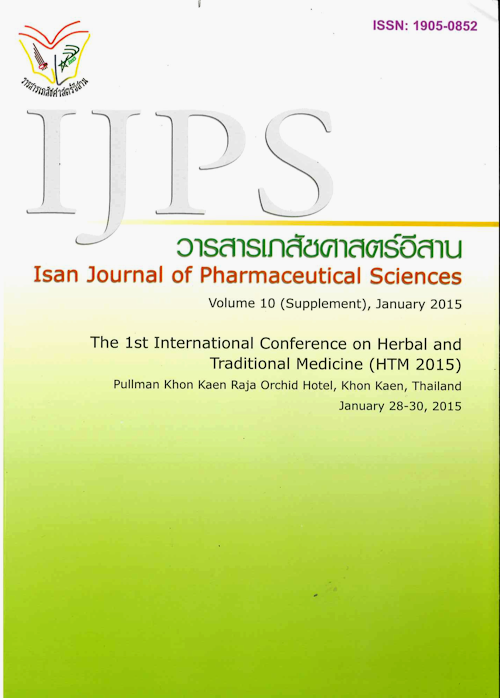Antiproliferative Effect of Raphanus sativus L. var. caudatus Alef in Human Breast MCF-7 and Human Lung SK-LU1 Adenocarcinoma Cell Lines
Main Article Content
Abstract
Introduction: This study was aimed to investigate the in vitro antiproliferative effect of Thai rat-tail radish—Raphanus sativus L. var. caudatus Alef or RS—the Thai indigenous plant in the same family as broccoli and cabbage. The isothiocyanates (ITCs) have been well-pronounced as the chemopreventive compound found in Brassicaceae plant. Methods: In this study, pod and stem of RS were extracted by dichloromethane via liquid-liquid extraction. Pure ITCs compounds—sulforaphane and sulforaphene—were used as the standards and positive controls. The crude extracts were inve stigated for their antiproliferation assay in the human lung cancer (SK-LU1) and human breast cancer (MCF-7) in comparable with the normal Vero cell line. Results: The results showed that only extract of RS pod showed antiproliferative effect. The SK-LU1 cells were most sensitive to sulforaphane (IC50 = 8.10±0.62 μg/ml), sulforaphene (IC50 = 17.05±0.18 μg/ml) and the RS pods extract (IC50 = 84.22±2.39 μg/ml) than those in MCF-7 cells. Conclusion: The present study indicated the potential of RS for further extended study of the chemopreventive effect of RS.
Article Details
In the case that some parts are used by others The author must Confirm that obtaining permission to use some of the original authors. And must attach evidence That the permission has been included
References
Bjorkman M, Klingen I, Birch ANE, Bones AM, Bruce TJA, Johansen TJ, Meadow R, Molmann J, Seljasen R, Smart LE, Stewart D. Phytochemicals of Brassicaceae in plant protection and human health - Infl uences of climate, environment and agronomic practice. Phytochemistry. 2011, 72: 538-556.
Cartea ME, Francisco M, Soengas P, VelascoP. Phenolic Compounds in Brassica Vegetables. Molecules 2011, 16: 251-280.
Cavell BE, Alwi SSS, Donlevy A, Packham G. Anti-angiogenic effects of dietary isothiocyanates: Mechanisms of action and implications for human health. Biochem Pharmacol 2011, 81: 327-336.
Cragg GM, Newman DJ. Plants as a source of anti-cancer agents. J Ethnopharmacol2005, 100: 72-79.
Jahangir M, Kim HK, Choi YH, Verpoorte R. Health-Affecting Compounds in Brassicaceae. Compr Rev Food Sci F 2009, 8: 31-43.
Kristjansdottir K, Kim K, Choi JS, Horan TC, Brard L, Moore RG, Singh RK. 7-Methyl indole ethyl is thiocyanate causes ROS mediated apoptosis and cell cycle arrest in endometrial cancer cells. Gynecol Oncol 2012, 126: 252-258.
Machana S, Weerapreeyakul N, Barusrux S, Thumanu K, Tanthanuch K. FTIR microspectroscopy discriminates anticancer action on human leukemic cells by extracts of Pinus kesiya; Cratoxylumformosum ssp. prunifl orum and melphalan. Talanta 2012, 93: 371-382.
Machana S, Weerapreeyakul N, Barusrux S, Nonpunya A, Sripanidkulchai B, Thitimetharoch T. Cytotoxic and apoptotic effects of six herbal plants against the human hepatocarcinoma (HepG2) cell line. Chinese Med 2011, 6: 39.
Pocasap P, Weerapreeyakul N, Barusrux S. Cancer preventive effect of Thai rat-tailed radish (Raphanus sativus L. var. caudatus Alef). J Funct Foods 2013, 5: 1372-1381.
Sun SY, Hail N, Lotan R. Apoptosis as a Novel Target for Cancer Chemoprevention. J Natl Cancer Inst 2004, 96: 662-672.

